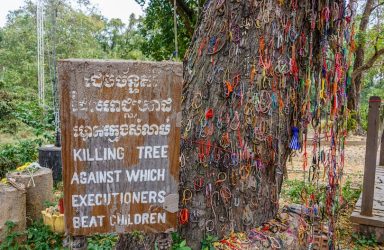Climate Change Policy Analysis
The United States will face considerable challenges in reducing the impact of climate change without robust legislation and a political commitment to the issue.
Should Multicultural Societies Institutionalise a Form of Group Recognition?
Multicultural societies should not institutionalize a form of group recognition, as it is unjust to expect an individual to respect a particular culture when their lifestyle or principles are attacked by that culture.
Challenges to Disarmament, Demobilisation, and Reintegration
In some cases the international community has exacerbated obstacles to DDR through arms sales to war-torn societies, budgetary constraints, or neglect of ex-combatants.
The Cambodian Genocide: Operationalizing Violence Through Ideology
The case of the Cambodian Genocide suggests that ideology does not only motivate but potentially supplements rational motives in operationalizing wide-scale violence.
Beyond the Narrative of China’s Debt Trap Diplomacy
Looking beyond the popular narrative of Chinese debt-trap diplomacy, it becomes clear that it does not hold up to scrutiny.
The Far-Right Sweden Democrats and the Construction of the Muslim Other
The Social Democrats in Sweden portray Muslims as a security threat to the Swedish identity by employing an ethnopluralist discourse.
Contractors in the “War on Terror”: Enabling Global Military Deployment
What has begun as the “War on Terror” and is now a series of “overseas contingency operations” could in fact only go on in the global fashion that it did for almost ten years now because of the services provided by several hundred thousand contractors. In short, private contractors serve as enablers of this decade-old war, much like they have become enablers of most major Western militaries.
How did Arab Nationalism Affect the Course of the Cold War?
Modern Arab nationalism originally developed as a backlash to the colonialisation of the Middle East by western powers such as Britain and France. Despite decolonisation, European imperialism was maintained through sympathetic conservative monarchs and the construction of an informal empire. As such, Arab nationalism continued to play a prominent role in Middle Eastern and global politics through much of the Cold War.
‘The October Russian Revolution and the 1944-8 takeovers in Central and Eastern Europe demonstrate that war is the decisive factor in the success of communist takeovers’ Discuss.
In October 1917, the Bolshevik Party staged the first communist revolution in history. With this, the new Russian leadership removed Russia from the Great War and began to put into action its ideological ideas for world revolution. In 1919 the Third Communist International (Comintern) was established with the role of exporting the revolution and creating, a ‘World Federative Republic of Soviets’ which was seen as crucial for the survival of the Russian soviet state. Despite this, and the economic problems of the interwar years, the only other country to witness a communist revolution before the Second World War was Outer Mongolia (and briefly, Hungary).
Contending Dialectics: Revisiting Material and Ideational Dimensions of Sovereignty
The state is understood to constitute the primary institutions holding sovereign authority. States, however, are no longer standing alone on the hill of sovereignty, which other actors have come to the climb, claiming their own sovereignty vis-à-vis the state.






